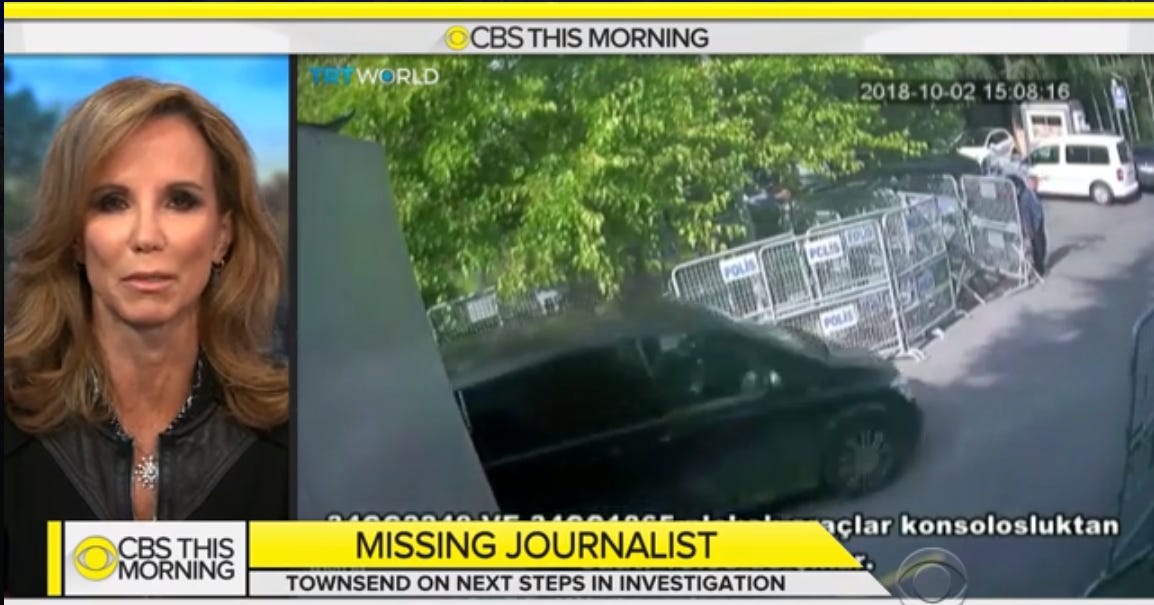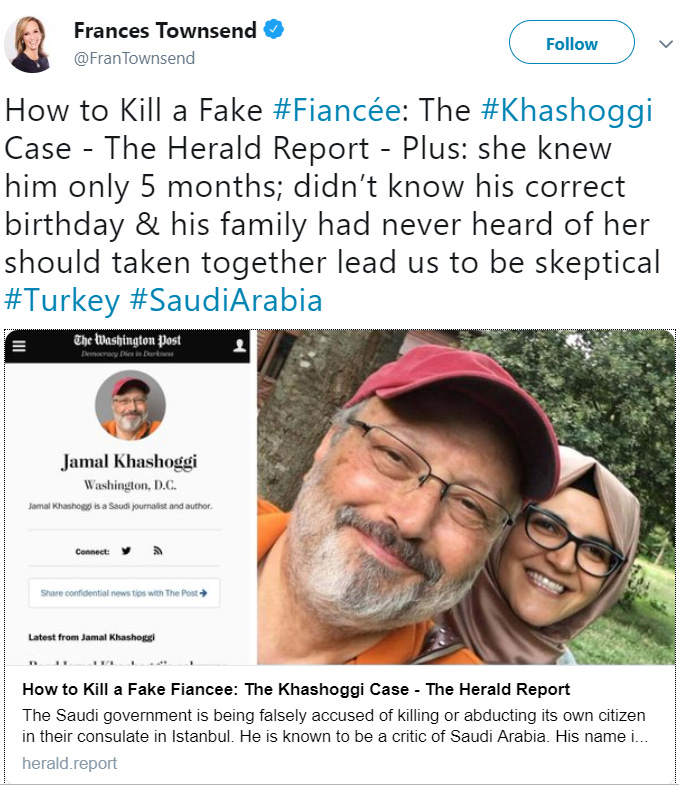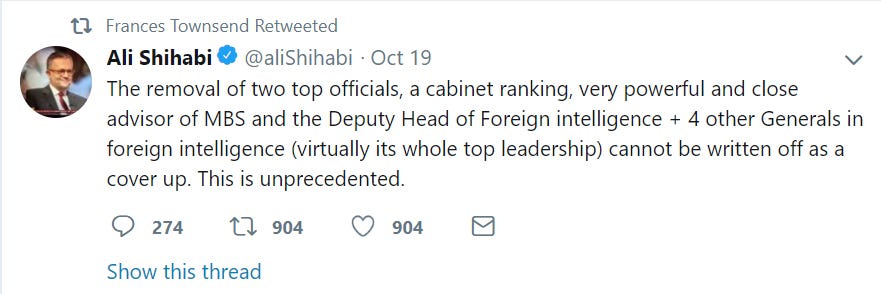💰 How Saudi money skews the news
Welcome to the free weekly edition of Popular Information -- written by me, Judd Legum.
To receive tomorrow's email, you'll need a paid subscription. It's $6 a month or $50 for an entire year. Paid subscribers get four newsletters a week.
I hope you'll give it a shot. If you have any questions, email me at judd@popular.info.
How Saudi money skews the news
Since the murder of Jamal Khashoggi on October 2nd in the Saudi consulate in Turkey, pundits have been weighing in on the incident, blanketing cable news and op-ed pages.
What isn't apparent to readers and viewers is how Saudi money influences this commentary.
Several prominent analysts commenting on Khashoggi's death have a significant financial interest in maintaining a positive relationship between the United States and Saudi Arabia. These financial conflicts have not been disclosed by the pundits themselves or the news outlets where they appear.
The true extent of these conflicts is unknown. Many financial dealings of the Saudi regime are opaque. But, by piecing together information that is publicly available, it's clear that Saudi money has compromised media coverage of Khashoggi's murder.
General Jack Keane

General Jack Keane is the co-founder of IP3. His company is pitching the Saudi regime on a multi-billion dollar project to bring nuclear power and related security services to their country. He has also been a constant presence on cable TV, opining on the Khashoggi murder, often expressing views that are very favorable to the Saudis. He never discloses his business objectives.
In August 2016, IP3 prepared a presentation for "His Majesty Salman Bin Abdul Aziz" to secure a contract. (It's unclear whether it was ever delivered.)

The presentation is full of flattery of the Saudi government. It praises "Vision 2030," a plan by Saudi Crown Prince Mohammed bin Salman (MBS) to diversify the Saudi economy, as "the roadmap" to meet the country's challenges. IP3 pitches its plan to build 40 nuclear reactors in Saudi Arabia by 2040 as a key part of MBS's plan.
The plan, IP3 argues, would make Saudi Arabia the undisputed leader of the region. The IP3 team, led by General Keane and others, would allow Saudi Arabia's security apparatus to "achieve world-class status." The company also promises a "deep and stable relationship" with the United States.
IP3 has modified its proposal to rely on U.S. firms to build the plants instead of the Chinese. The Trump administration, which has been lobbied by IP3, is considering bending the rules designed to limit nuclear proliferation to allow U.S. companies to participate in the Saudi power plan. The company has enlisted Tom Barrack, a close friend and financial backer of Trump, to make its case.
Keane's economic interest in Saudi Arabia has not dissuaded him from repeatedly offering his “expert opinion” on the country as a national security analyst for Fox News. On October 11th, he appeared on Benson and Harf, a Fox News radio show, and was asked if he believed Saudi Arabia was responsible for Khashoggi's death:
That's hard for me to fathom. I've watched what Mohammad Bin Salman, who is the Crown Prince and heir to the throne, has pursued for a couple of years. He developed a vision for 2030, with the help of some thoughtful Americans to be frank, which is quite transformational for the regime. To say it's revolutionary is actually an understatement. It touches every fabric of Saudi society... To think that he would risk all of that over this doesn't pass the common sense test, but again this is the Middle East and at times some things don't pass the common sense test.
Even if Saudi Arabia was responsible, Keane argued that the United States should do something to "get their attention" without disturbing the fundamental relationship:
I do think we have to look at what has happened in the Middle East. Why is Saudi Arabia's relationship important to us? We look at Saudi Arabia to help provide stability and a degree of measured security in the region... I think if some kind of action needs to be taken against the Saudis for doing something this despicable I think we can find the right lever to do that and try to use it as a vehicle to truly get their attention.
After the Saudis admitted that Khashoggi was killed in the Saudi consulate, Keane pivoted and, in various interviews on Fox News channels, said the U.S. should "reserve judgment" until the Saudis complete their "investigation." Keane said the United States should collaborate with the Saudis on their investigation to lend it credibility.
Nevertheless, Keane said, "the reality is the relationship with the kingdom of Saudi Arabia and the United States is in the U.S. national interest, and that will also guide us in terms of what we are going to do about this." Keane said the goal in any action by the U.S. in response should be to create an environment to "rebuild trust again."
Rebuilding trust would also be essential if Keane's proposal to build 40 nuclear power plants in Saudi Arabia has any chance of coming to fruition.
Fran Townsend

Fran Townsend, the former Homeland Security Adviser to George W. Bush, is now a national security analyst for CBS News. She is also a director at IP3 and featured in its proposal to build 40 nuclear power plants in Saudi Arabia.
Townsend has only made one appearance on CBS News about Khashoggi's death, and her commentary was more circumspect. She emphasized "problems" with the Saudi account that Khashoggi was killed in an interrogation gone wrong. She said the "Saudis and Americans were looking for a way to get past this."
On Twitter, Townsend has struck a different tone. In addition to sharing mainstream media stories on Khashoggi's death, she has shared wild pro-Saudi conspiracy theories. She shared an article from the "Herald Report" claiming "[t]he Saudi government is being falsely accused of killing or abducting its own citizen in their consulate in Istanbul."
Khashoggi went to the consulate to get papers he needed to marry his fiancée. The Herald Report article claims, without evidence, that a photo of Khashoggi with his fiancée, published widely in the media, was photoshopped and the engagement was fabricated.

The author of the article, Majed Aleisa, was banned from Twitter for spreading fake news about Khashoggi. He has recently decamped to Gab, an alternative social media website popular with white nationalists who have been banned from Twitter.
Townsend also posted an article by Al Arabiya, a media outlet controlled by the Saudi royal family, linking Khashoggi's fiancée to terrorists.
Townsend's tweets, in turn, have been cited approvingly by Al Arabiya.
While the arrest of 18 people for Khashoggi's death was widely derided as a coverup designed to protect MBS, Townsend had a different approach. She retweeted Ali Shihabi, the head of The Arabia Foundation, an organization funded by Saudi businessmen with close ties to the government, who said the arrests were "unprecedented" and "cannot be dismissed as a coverup."

Townsend, while acknowledging that the Saudi’s story was not credible, stressed that the U.S. should not "break off relations" because of the murder.
Townsend, a prolific Twitter user, has never tweeted about her position with IP3.
Dennis Ross

Dennis Ross has been an adviser on the Middle East to presidents of both parties. He was appointed a special adviser to the Persian Gulf and Southwest Asia by former Secretary of State Hillary Clinton. He is also on the advisory board of IP3. His position with the company was featured in the August 2016 pitch deck to the Saudi King.
Ross is a columnist with the Washington Post, where he is identified as "a distinguished fellow at the Washington Institute" who "served in senior national security positions in the Reagan, George H.W. Bush, Clinton and Obama administrations." His role at IP3 is never disclosed.
In an October 11 column, published nine days after Khashoggi was killed, Ross heaps praise on MBS and his father, King Salman. He said that MBS was bringing "fun" to Saudi Arabia.
Today, in Saudi Arabia, Crown Prince Mohammed bin Salman (MBS), along with his father, the king, are defining Saudi national interests, with MBS driving revolutionary change in the kingdom. Why is he pushing social and economic changes so aggressively? Because MBS, even before his father became king, saw an unsustainable reality… His answer: diversify the economy, create greater social openness and fun, and produce a sense of possibility for Saudi youth.
He goes on to say that MBS deserves more credit for visiting the U.S. Holocaust museum and his reforms are the key to curb terrorism in the region. He specifically shouts out Vision 2030, which is the initiative that IP3 is latching onto for its nuclear power proposal.
At the end of his article, Ross offers only muted criticism of MBS. "I hope Khashoggi is not dead and will soon reappear. I also hope MBS understands that the ends cannot justify any means," Ross writes.
It wasn't the first time Ross weighed in on MBS in the pages of the Washington Post. On February 12, Ross wrote a column entitled "America should get behind Saudi Arabia's revolutionary crown prince." Ross did not disclose at the time that he is part of a company trying to convince MBS to get behind its business venture.
In an October 18 appearance on MSNBC, Ross said that the "interrogation gone wrong" theory is plausible and could be a "saving grace."
It may be that, in fact, this was designed to be a rendition bringing him back to Saudi Arabia or an effort to intimidate him, and it was an operation gone wrong. And he might -- he might honestly say, "Look, this was never supposed to happen in terms of killing him." That may be the one saving grace or at least the one explanation that he can grab onto and that also the administration will.
Ross did not disclose his financial interest in MBS, whose economic agenda is essential for IP3's proposal to move forward, in maintaining power.
The tip of the iceberg
How do we know so much about IP3's plans? The company briefly employed Michael Flynn while he served as a top adviser to Trump's presidential campaign. After Flynn was forced to resign after lying about his contacts with Russia, he became the subject of Congressional investigation. That investigation uncovered his relationship with IP3 and the August 2016 presentation.
IP3's entanglement in a Congressional investigation is unusual. In most circumstances, economic relationships between Saudi Arabia and former government officials could stay private. The scope of the problem is unknown. Absent standards by media organizations requiring the disclosure of these conflicts, it will remain that way.
Thanks for reading! Send me feedback at judd@popular.info.
To receive tomorrow's email, you'll need a paid subscription. Paid subscribers receive four emails each week.




wow! i haven’t read anything about this. and Flynn - so much comes back to that.....
Always about money. My Daddy used to say whether you had it or wanted it, it was the root of all conflics be it in a marriage or in war.. He was a smart man.
Makes me sad how we put up with a brutal murder so we can suck up the Saudis. Did it after oil embargo in the 70s and def after 9/11.